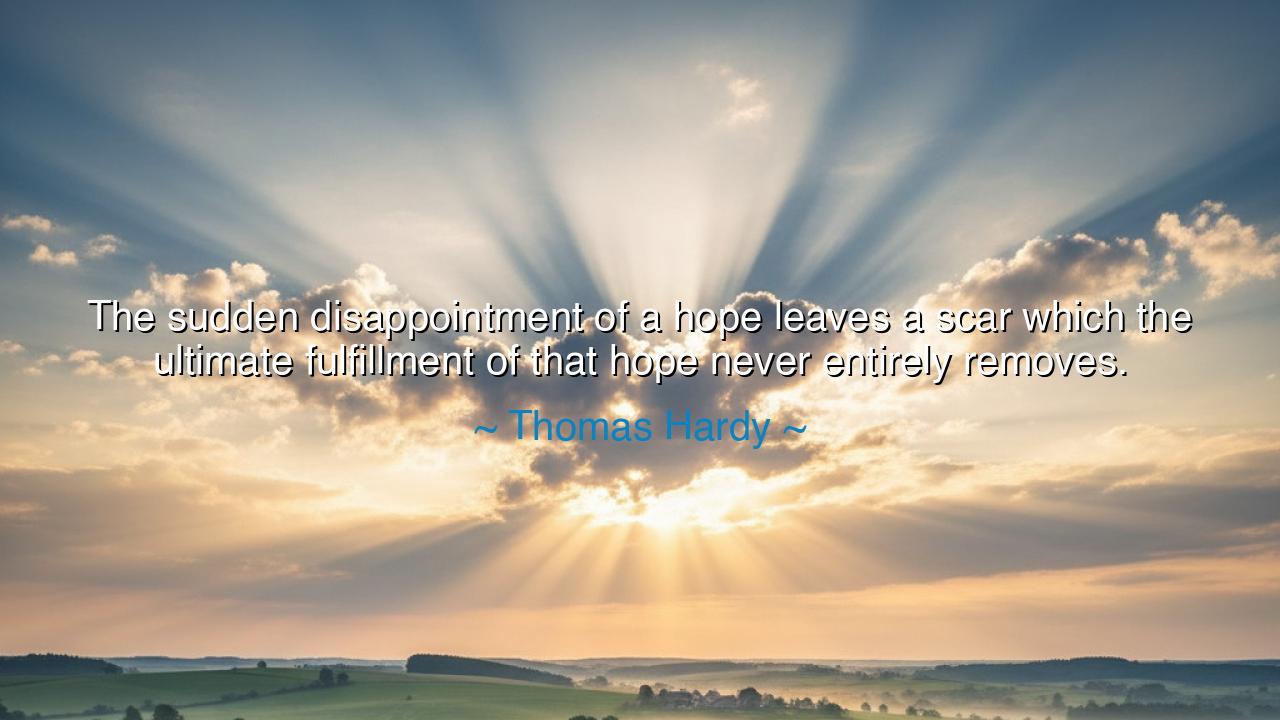
The sudden disappointment of a hope leaves a scar which the
The sudden disappointment of a hope leaves a scar which the ultimate fulfillment of that hope never entirely removes.






The words of Thomas Hardy—“The sudden disappointment of a hope leaves a scar which the ultimate fulfillment of that hope never entirely removes”—speak with the quiet sorrow of one who has gazed long into the chambers of the human heart. Hardy, the poet of fate and the chronicler of life’s cruel ironies, reveals here one of the deepest truths of the soul: that hope, though divine in its origin, carries within it the seed of pain. When it is suddenly broken, the wound it leaves is not healed even by later joy. For the heart remembers its breaking, and the shadow of that moment, faint though it may become, remains etched into its memory forever.
This quote arises from Hardy’s lifelong contemplation of the fragile balance between desire and disappointment, between what we long for and what the world allows. Born in the quiet fields of Dorset, he lived among those who worked the land, dreaming simple dreams—dreams often crushed by circumstance. In his novels and verses, Hardy captured this truth with relentless honesty: that even when the universe gives back what it once denied, the heart does not forget the moment of loss. For it is not merely the absence of what we hoped for that hurts—it is the betrayal of expectation, the collapse of faith in the fairness of life. When hope falls, it teaches the soul caution, and that caution, though wise, dims the light of future dreams.
To feel the sting of this truth, one need only look to the life of Abraham Lincoln. Before he became the savior of a nation, he was a man of sorrows. In his youth, he lost the woman he loved, Ann Rutledge, and the despair that followed nearly ended his will to live. Years later, though he rose to greatness, guiding a fractured people through the fires of civil war, those who knew him said a sadness never left his eyes. The triumphs of his later years—the emancipation, the victory of unity—could not erase the scar left by early heartbreak. Like Hardy’s words, Lincoln’s life reminds us that joy and pain are not opposites but companions, and that the wounds of hope betrayed shape the wisdom of the heart.
Hardy’s insight also speaks to the nature of memory, which does not heal as the body does. The body forgets its cuts and bruises, but the mind remembers the exact hour when hope died. When at last that same hope is fulfilled—when the dream is realized, the love returned, the struggle overcome—the joy is tinged with remembrance. We smile, yet somewhere inside us the echo of loss whispers still. This is not bitterness but the mark of depth, the sign that we have lived, felt, and endured. Only those who have been wounded by hope truly understand its power—and its peril.
In this way, Hardy’s words are both mournful and wise. He does not tell us to abandon hope, but to reverence it—to recognize its weight and fragility. Hope is a sacred fire, but it burns as easily as it warms. The wise man, therefore, hopes with courage, not with blindness. He knows that the world may break his expectation, yet he hopes still—not because he trusts fate to be kind, but because he trusts himself to rise again when fate is cruel. The scars of disappointed hope, then, become not symbols of weakness, but of endurance. They are the inscriptions of those who dared to believe in spite of the odds.
Consider also the lesson of Marie Curie, who endured poverty, loss, and prejudice in pursuit of her vision. Many times her experiments failed, many times her funding vanished, and in 1906 she lost her beloved husband, Pierre, in a sudden accident. Yet even as grief scarred her heart, she continued her work. When she finally succeeded in isolating radium and received the world’s acclaim, that triumph did not erase her sorrow—but neither did sorrow diminish her greatness. Her scar became her strength, the quiet reminder that hope may break, but it can be rebuilt. Hardy’s truth holds even here: fulfillment cannot erase pain—but pain can give fulfillment its meaning.
Let this, then, be the teaching: do not fear the scars of hope. For they are proof that you have loved, striven, and dared to dream in a world that often disappoints. When hope fails, let yourself grieve; but when it returns, accept it with humility, remembering the cost of its loss. The scar will remain, but it need not be a wound—it can be a mark of wisdom, a testament to the strength of your soul. The ancients said that the oak grows strong not in calm weather, but in storms; so too does the heart deepen not through fulfillment alone, but through disappointment endured.
Thus, in the voice of Hardy we hear both warning and consolation. Every human being who lives and loves will bear such scars. They are not to be hidden or regretted, but honored. For the scar of disappointed hope is the seal of a life lived in pursuit of meaning. It tells us that we have dared to dream like waking men, and though the world has wounded us, we have not ceased to dream again.






AAdministratorAdministrator
Welcome, honored guests. Please leave a comment, we will respond soon